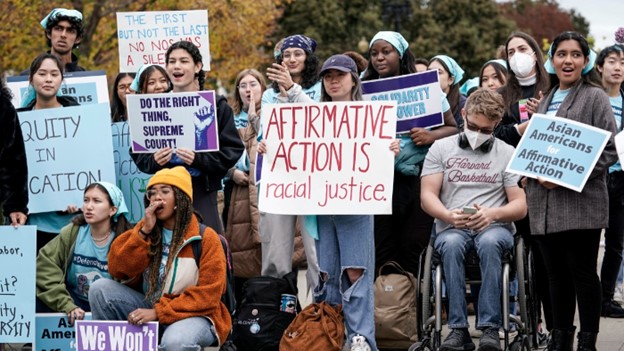
In 1964, Wesleyan University contacted 400 Black high school students from around the country to persuade them to apply in hopes of erasing its image as a privileged gallery for white, wealthy families. The outreach led to the enrollment of one Latino and 13 Black students, which helped establish the university’s commitment to diversity.
Nearly 60 years later, such recruitment practices are in jeopardy.
In cases against Harvard and the University of North Carolina, the Supreme Court is expected to overturn or roll back affirmative action in college admissions. Education experts say this could not only lead to changes in admittance but also jeopardize the strategies colleges have used to build diverse classes. These strategies include programs intended to reach specific racial and ethnic groups for scholarships, honors programs, and recruitment.
These rollbacks could spur a domino effect for colleges to end other admissions practices. Some schools have already ended their standardized test requirements and preferences for children of alums.
College officials warn that there is no way of knowing how extensive the court decision will be. The ruling, however, is likely to have a broad impact on many schools, according to Vern Granger, the director of admissions at the University of Connecticut.
“Most people are thinking about the admissions process at selective institutions,” he said, “but I would say that this decision is going to be far-ranging, and it’s going to be expansive.” The cases against Harvard and the University of North Carolina, first filed in 2014 by Students for Fair Admissions, an anti-affirmative action group, argued that the universities discriminated against white and Asian applicants by giving preferences to Black, Hispanic, and Native American students. The universities said they use race-conscious admissions because diversity is critical for learning.
Education officials said if the court rules as expected, the class admitted for the fall of 2024 will look quite different.
“We will see a decline in students of color attending college before we see an increase again,” said Angel B. Pérez, the National Association for College Admission Counseling chief executive. “We will be missing an entire generation.”
Two hundred colleges and universities are most likely to be dramatically affected because they are regarded as “selective” — meaning they admit 50 percent or fewer of their applicants. For smaller, highly selective colleges, like Wesleyan, the impact on college culture could be noticeable, as professors on these campuses say their small classes thrive on interactions by diverse students.
To avoid legal challenges, many college programs, like a diversity leadership program called UConn Summer Lead at the University of Connecticut, broaden eligibility to applicants, for example, for those who would be the first in their families to attend college.

Recent Comments